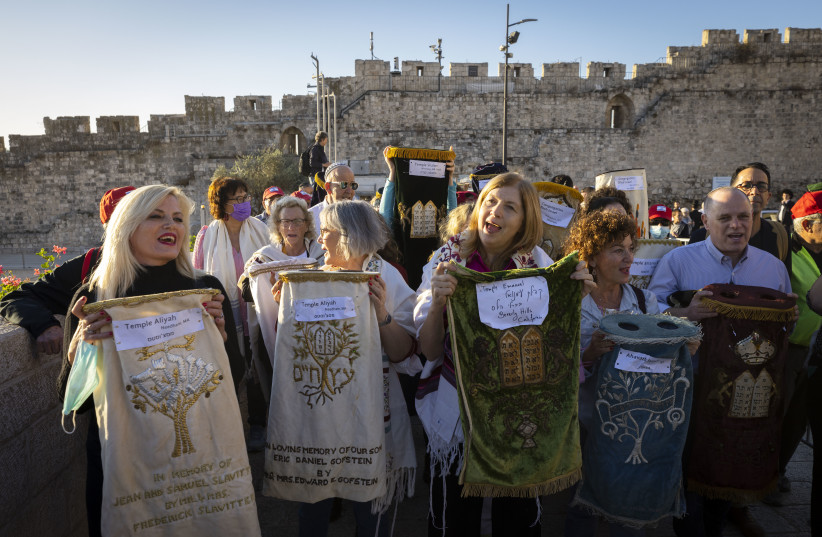Members of the Women of the Wall (WoW) faced violent opposition as they attempted to bring Torah scrolls to the Western Wall last Friday. It wasn’t the first time, and once again showcased how lack of compromise continues to fan flames of strife within the Jewish people.
For years, there have been moderate voices who wanted a compromise on the issue of egalitarian prayer at the Kotel. However, extremists have preferred the path of violent confrontation.
Unfortunately, opposition leader Benjamin Netanyahu, while he was prime minister for over a decade, never implemented an important compromise that was formulated. He tied himself too closely to haredi (ultra-Orthodox) extremists over the years, a policy that has continued to this day.
Before Friday’s incident, Netanyahu retweeted a call by Shas leader Arye Deri to confront the Women of the Wall’s scheduled prayer service at the Kotel. On Thursday afternoon, Deri tweeted that he and 10 other MKs would go to the wall on Friday morning and called on “anyone for whom the Western Wall is important to pray with us so that, God forbid, this holy site should not be desecrated.”
Such utterances have fomented hatred and attacks against WoW and other groups that are demanding equal access and rights at the Western Wall.

“The Kotel framework was passed in a government led by Netanyahu and then frozen when Netanyahu gave in to [Shas leader] Arye Deri and [United Torah Judaism chairman Yaakov] Litzman,” Finance Minister Avigdor Liberman said on Monday. “It is a reasonable solution: Now is the time to implement it.”
Unfortunately, the haredi parties in the Knesset continue to oppose the deal.
“The Reform and Conservatives are sticking their hooves into the holy of holies of the Jewish people, and getting a foothold in the Western Wall,” UTJ said in a statement. “We will protect, without compromise, the Western Wall and its sanctity, and we will not allow anyone to desecrate it,” the party said in October. The use of terms like “hooves” is an example of the incitement against the other Jewish movements.
Another example was provided on Saturday night, when Rabbi Meir Mazuz, who is affiliated with Shas, said that Reform Jews destroy Judaism. Russian-Israelis, he added, were heretics.
The best way to stop the incitement is for the government to show these people that their words of hatred will not work and that Israel will be the Jewish state by allowing all Jews the right to practice Judaism here how they see fit.
Back in August, reports said that the government intends to advance the Western Wall agreement for a state-recognized, non-Orthodox prayer section at the holy site. It delayed doing much about it while trying to pass a budget. But now that there is a budget, the excuses can stop. It is time to invest in the new section.
“Once the budget is passed, I believe we should start to see progress, which should be early November at the beginning of the winter session, and we should see the agreement come into effect,” MK Alon Tal of Blue and White said at the time.
Well, “after the budget” has arrived – which means that now is the time for Prime Minister Naftali Bennett and Foreign Minister Yair Lapid to make good on their promise to open the Western Wall to pluralistic prayer. Now, after the government passed a two-year budget last week, the time is right to reintroduce the compromise and to pass it within the cabinet.
Polls conducted in the past by The Jerusalem Post have shown widespread support for the egalitarian prayer plaza at the Kotel. One poll from 2016 found that 61% of Israelis favored creating such a site and 39% opposed it – and there was no difference in support between men and women. While 83% of Orthodox respondents oppose creating the site, 82% of secular Israelis and 59% of those who define themselves as traditional support it.
Now is the time to stand up to extremists and show that a compromise can be reached. This is a long journey, but as a diverse Jewish people, we can provide space for everyone.
